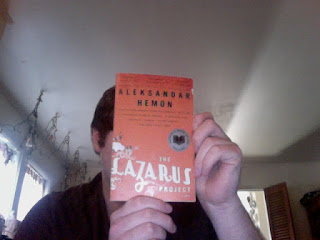After reading six books that
failed to make me giddy with praise, a little book comes along and changes
that. I had no idea I was going to like Being Dead by Jim Crace this much. I am
not familiar with Crace all that much despite owning a few of his books, but he
is really quite something, and definitely a hidden gem among writers from
Britain if his other books are this good. It is, just like The Night Watch, a
book that does not really do anything special or unique. But the message of
this book is something that is truly noteworthy. It manages to take a dark plot,
where the two main characters are lying dead in a British sand dune, and
proceed to tell a story full of meaning that is both comforting and uplifting,
despite the horrific beginnings. It is never saccharine about the subject of
death and does not try to bring in religion to explain what happens after the
bodies have lost their lives. It takes a very scientific and naturalistic
approach to the proceeding events after said death, and in the hands of an
unskilled writer, it would have been a brutal examination of the worthlessness
of life, and thankfully, it is the exact opposite. As I said before, at the
beginning, Joseph and Cecile, both zoologist and married for thirty years, lie
murdered in a sand dune. Their murder is graphically described and senseless in
it execution and brutality. From there, we are given three separate storylines
that center on this murder. We go back in time to see the beginnings of Joseph
and Cecile’s relationship, which begin at a cottage nearby the murder site, and
a story that is also plagued with the finality and suddenness of death. The
present storylines chart the actions of the couple’s daughter, who is somewhat
spiteful toward her parents, who we knowingly see headed for a collision course
with grief and regret. Finally, the real meat of this novel follows what
happens the bodies that lie undiscovered in the dunes, and how nature
indifferently takes things over. We see the semi nude bodies of Joseph and
Cecile, as they become victims to the elements, from winds that partially bury
their bodies to the bugs that feast on their excretions. It is something gross
that is somehow described beautifully. And for all these heinous topics being
talked about here, I rarely felt bummed out, and felt this book was quite life
affirming at the end without being mystical. While the lives of Joseph and
Cecile ended violently, as our lives might end as well, it does not make the
things we do and the people we love useless and not worth anything. It is
actually the fragility and briefness of life that makes things important and
relevant, like the bug with a twenty-four hour lifespan that Joseph so lovingly
muses on. I am glad I read such a book, and hope it makes you look at the end
of life possibly being the actual end with a little less cynicism.
Rating: 5/5




